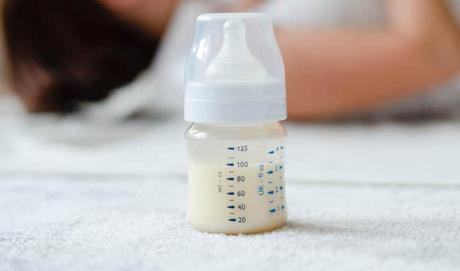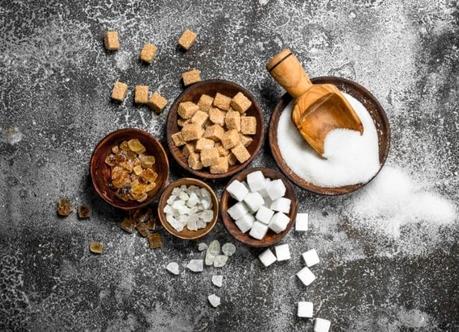This post may contain affiliate links. Please read my disclosure.
When you look at baby formula ingredients, one ingredient tends to stand out: sugar. It often looks like "corn syrup" "syrup solids" "glucose syrup" or "glucose syrup solids" - but all of those are just code words for sugar. Which begs the question: What is the deal with corn syrup in baby formula? Why is it there? This post will tell you everything you need to know about corn syrup in baby formula, including which formula options are the best for your baby!
Whenever I'm buying packaged foods, I'm always looking at the ingredients to make sure there is no added sugar in whatever I'm buying.
Which is why, I was shocked when I discovered that the majority of baby formulas out there were adding sugar to the formula!
Why Is Sugar or Corn Syrup in Baby Formula?
All baby formulas need fats, protein, carbohydrates and vitamins/minerals - to mimic the composition of breastmilk. Some baby formulas will add extras like DHA, ARA, and pre/probiotics to further match what breastmilk has to offer.
Unless you're using a goat milk formula, the protein source for all baby formulas is typically cow's milk. Fats can come in all forms - a variety of oils can be used like coconut oil, palm oil, soy oil, etc.
But when it comes to the carbohydrate source - there are lots of options. And this is where sugar comes in!
Sugar is a carbohydrate. So are all forms of sugar: glucose syrup, corn syrup, brown rice syrup, etc. And that's why added sugar in some form can end up in baby formula.
But not all sugars are created equal! Some are higher glycemic (more on that later) and are much less healthy for your baby. Unfortunately, the less healthy sugar options available are also the cheapest. Which is why they often will be chosen as the carbohydrate source in baby formula!

What Are The Different Types of Carbohydrates in Baby Formula?
Infant formula has to meet a certain level of carbohydrates. That is regulated by the FDA. Both the FDA and the European Commission require that infant formulas provide 40% of their calories from carbohydrates.
However, the source of those carbs is up to the manufacturer of the formula. In the US, carbs can come from five main sources: Lactose, Maltodextrin, Glucose, Sugar, or Corn syrup.
Lactose: The Best Carbohydrate Source for Baby Formula
For an infant, lactose is most like what is in breastmilk and is the most desirable choice. It's also lowest on the glycemic index scale - meaning that it won't increase blood sugar levels nearly as fast as glucose or sugar will. Lactose is healthier for babies to metabolize, and can help maintain stable blood sugar (and therefore insulin) levels.
The EU has some limits and guidance on how much corn syrup can be used, and bans the use of corn syrup solids in organic formula, but the US does not. Which means that infant formula in the US can contain 100% of its carb source, from you guessed it, corn syrup!
Which Baby Formulas Use Lactose?
There are great options for baby formula that don't use corn syrup, and use only lactose as the primary carbohydrate. European formulas available in the US use lactose, as do a handful of US based formulas (Bobbie Organic Infant Formula being the best option made in the US).
Other Carbohydrate Sources for Baby Formula: Corn Syrup in Baby Formula, Maltodextrin, and Glucose
Glucose and Corn Syrup in Baby Formula
Why are glucose and corn syrup used in baby formula? Because it's widely available and very cheap to produce. The problem with corn syrup (and all glucose/sugar in general) is that it's a fast-acting carbohydrate. This means that it's high on the glycemic index, and quickly increases blood sugar.
"The Glycemic Index (GI) is a relative ranking of carbohydrates in foods according to how they affect blood glucose levels. Carbohydrates with a low GI value are more slowly digested, absorbed, and metabolized and cause a lower and slower rise in blood glucose and, therefore usually, insulin levels." - The Glycemic Index FoundationInfants are physiologically equipped to metabolize lactose, since that's what's in breastmilk. Lactose has a Glycemic Index value of 46. Glucose, corn syrup, and other syrup solids however, have a GI value of 100.
Maltodextrin and Other Sugars in Baby Formula
Maltodextrin is a type of sugar that is made up of glucose. Maltodextrin will become syrup if it is broken down further, so it's essentially the same thing as added sugar.
Glucose syrup is the same thing as corn syrup! It just means that the syrup was extracted from a different plant - but it's still the same as sugar.
Sucrose is table sugar, and has a lower glycemic index than glucose, but higher than lactose.
What About The Use of Corn Syrup in Baby Formula for Sensitive or Hypoallergenic Needs?
Corn syrup, sucrose, maltodextrin are most used in "sensitive" formulas. That's due to the fact that these formulas are designed for babies who are lactose intolerant, and so formula manufacturers are trying to replace lactose with an alternative carbohydrate.
Sometimes some corn syrup or glucose syrup is necessary in hypoallergenic formulas, because those formulas use hydrolyzed milk proteins, which are essentially partially digested milk proteins - and they taste/smell bad! So the corn syrup is used to try to mask the taste of the hydrolyzed milk protein.
But there are hypoallergenic formulas that do not overuse glucose and use healthier forms of carbs. See this list for the healthiest formulas for sensitive or hypoallergenic babies!
Final Thoughts
Why Is There Corn Syrup in Baby Formula?
There are a few reasons why formula manufacturers choose corn syrup over lactose in baby formula:
- It's a carbohydrate that babies can digest
- It's cheap to produce
- Some sugars like maltodextrin also provide the function of thickening and emulsifying the formula for a better "mouth feel""
- Corn syrup is sweet! And babies like sweet things - which might make formula more palatable to babies.
- In hypoallergenic formulas, corn syrup might be used to make the formula taste better and mask the hydrolyzed milk protein taste.
What Baby Formula Should You Buy?
My main piece of advice here is to look for baby formulas that are made with 100% lactose! And if your options are limited and you can only find (or buy) formulas that include corn syrup or syrup solids, try to find a formula that has both lactose and corn syrup, so that at least you're not getting as much corn syrup in your formula.
The Best Baby Formula That Has No Corn Syrup Added
If you want to know our pick for the best baby formula with no corn syrup made in the US, it's Bobbie Organic Infant Formula. Why is Bobbie the best? In short, it's USDA Organic certified, Non-GMO, has the highest quality ingredients formulated to be as close to breastmilk as possible, and is designed specifically for babies 0-12 months of age. Most importantly, its carb source is 100% lactose from Organic Valley Milk!
I hope this post helped you navigate the world of baby formula, and better understand the different types of carbohydrate sources used, so you can find the best option for your little one! If you have any questions, don't hesitate to leave a comment or contact me here - I respond to every message I get!
